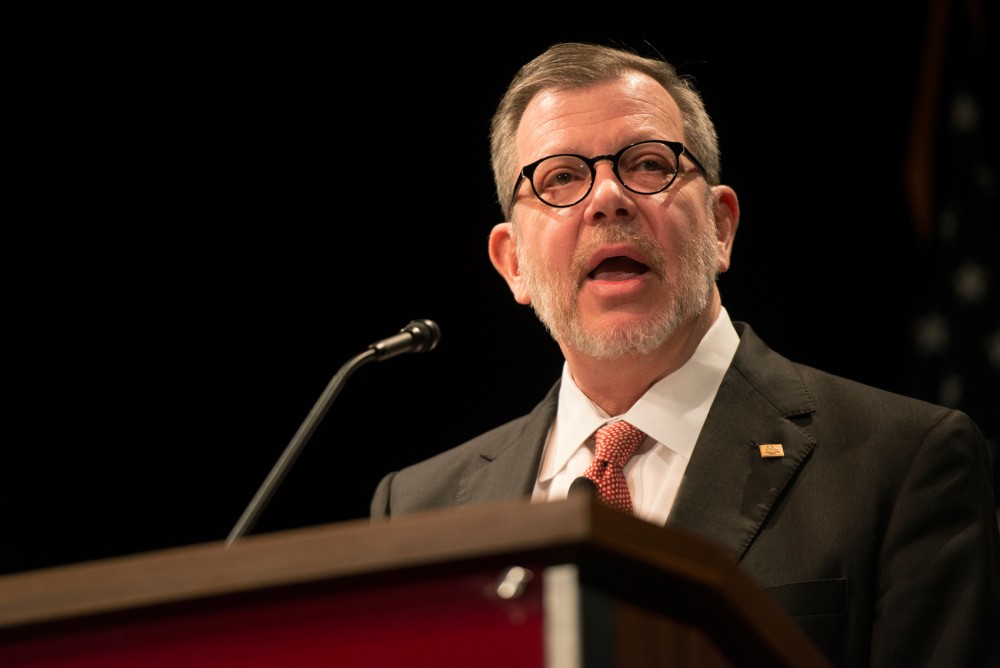In his fifth State of the University address Thursday, University of Minnesota President Eric Kaler outlined some of his ongoing goals for the University, such as increasing campus diversity, providing financial aid and furthering the University’s role as a public research institution.
“I know all the critical issues I face with you, from ethical research to campus climate to faculty governance to tuition policy. They are pressing, and they are at the top of my priorities,” Kaler said to a crowd of roughly 300 people at Coffman Union.
As Kaler recounted the University’s recent research projects, he acknowledged a February report showing issues with human research in the University’s Department of Psychiatry.
“I am listening carefully to concerns as we keep our pledge to be a model for human participant research,” Kaler said.
Kaler said he is listening to the concerns of students and faculty as he makes decisions regarding tuition and improving campus climate. He recounted the recent creation of a campus climate workgroup and a bias response team to assess reports of unfairness.
Kaler ended his speech by advocating the importance of the University’s philanthropic projects and restating the University’s goals.
The same day, Kaler presented funding requests to renovate and build science facilities at the Minnesota House Capital Investment Committee.
The projects include renovating the East Bank campus’s Pillsbury Hall and constructing a Chemistry and Advanced Materials Science building on the Duluth campus.
The estimated cost of all the projects is $236.3 million.
Responding to questions
After the speech, Kaler addressed audience questions concerning mental health, tuition and campus diversity.
An audience member asked if Kaler thought Vermont Senator Bernie Sanders’s plan for free tuition was plausible.
“If the government decided to spend money to pay for college, that’s a doable thing,” Kaler said, adding he thinks it’s unlikely because of political gridlock.
Students having something invested in their education makes them more likely to succeed, he said.
“If a student has something in the game, they’re more engaged,” he said.
Tuition for out-of-state students is proposed to increase 15 percent for the 2016-2017 school year, he said. The increase in tuition brings the University closer to the Big 10 Conference median, Kaler said.
Still, students have expressed concern over the increase in tuition.
“I think [the tuition hike] is going to decrease diversity,” finance junior Anna Mirkin said.
For many students, in-state universities are cheaper than going to the University as an out-of-state student, she said.
Another student questioned Kaler on his goals to diversify campus and said Kaler took ideas from Whose Diversity? without crediting the group.
In response, Kaler said the group and the University have different methods of achieving the same goals.
After a question about a perceived lack of mental health resources on campus, Kaler said he wants to identify understaffed locations and find ways to cut wait times.
Philosophy and gender, women and sexuality studies professor Naomi Scheman called for a switch to “a culture of responsibility” in the University’s human research program.
In response, Kaler said part of the challenge is getting new leadership in the psychiatry department.
“It will literally take years to change that culture,” Kaler said.


